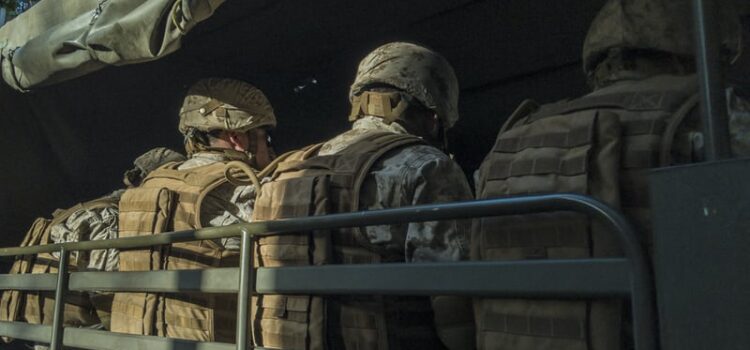

This article is an excerpt from the Shortform book guide to "Battlegrounds" by H. R. McMaster. Shortform has the world's best summaries and analyses of books you should be reading.
Like this article? Sign up for a free trial here.
How should the U.S. deal with Russian aggression and Chinese economic warfare? In what ways should the U.S. go on the offensive?
In Battlegrounds, General H. R. McMaster describes the global challenges that the U.S. faces. He believes they can be met under certain conditions. He urges the U.S. to remain vigilant against open aggression and to use the truth to counter the propaganda of oppressive regimes.
Read more to learn McMaster’s recommendations regarding American military strength in the current global climate.
American Military Strength
It’s vital to acknowledge that there are authoritarian forces in the world that view democratic nations as a threat to their power. McMaster insists that American military strength must stand firm against these forces, whether they be governments or terrorist organizations. America and its allies must be prepared for conflict while improving its defense against cyberattacks and making use of information media to counter the narratives spread by oppressive regimes.
McMaster recommends that the U.S. and NATO increase their military preparedness, specifically as a defense against Russian aggression. Diplomatic ties across the world should be bolstered against China’s divide-and-conquer economics. In the Middle East, the long-term goal should be ending sectarian conflicts while partnering with law enforcement and allied intelligence networks to cut off funding and support for terror groups. Meanwhile, America must engage with the community of nations to let aggressor states know that violent action is not a viable path to their goals.
| The U.S. on the Global Stage To implement McMaster’s diplomatic strategies, the first step for the U.S. is to reestablish its standing with its allies. Early in his presidency, Biden set repairing alliances as a top foreign policy priority. A Gallup poll confirms that global views of U.S. leadership rebounded soon after Biden took office, even as Biden’s approval ratings within the U.S. faltered. The war in Ukraine has served as a litmus test for Americans’ willingness to engage in global conflict. By the start of 2023, the U.S. had provided $25 billion in military aid to Ukraine, $15 billion in financial support, and $10 billion in humanitarian assistance. Polls in 2022 showed a shift from a belief among Americans that the U.S. wasn’t providing enough support toward a general feeling that the country was taking the appropriate steps in the conflict. A majority of Americans have been following the conflict and remain in favor of providing assistance. |
Beyond these traditional avenues of diplomatic and military intervention, the U.S. must go on the offensive and regain ground in the world of cyberspace. This includes intercepting cyberattacks before they happen and countering attempts to subvert elections through social media. McMaster also points out that America must maintain control of its information infrastructure. In this, the private sector is just as important, if not more so, than the government. U.S. companies and academic institutions must recognize the national security risks involved with breaches of their information security and be prepared to defend themselves accordingly.
(Shortform note: According to the International Telecommunication Union’s Global Cybersecurity Index, the U.S. leads the world in terms of cyber threat prevention, laws to protect data, and readiness to defend against attacks in cyberspace. Nevertheless, perpetrators of cybercrime are growing more sophisticated, and while some forms of online attacks are in decline, the total harm done by internet criminals may soon grow beyond $10 trillion per year.)
However, while technological secrets must be protected, it’s been shown that despotic regimes are vulnerable when their people have access to information outside of government channels. Radical groups such as the Taliban also rely on an uneducated populace susceptible to propaganda. McMaster says the U.S. should establish information paths into oppressed societies, both through online media and by befriending communities of ex-pats. The latter can be accomplished through community outreach programs and by welcoming foreign students into academia. When America creates a positive impression on those who’ve fled from dictatorial rule, that impression often trickles back and undermines their leaders’ claims to power.
(Shortform note: The Internet would seem to be the easiest way to provide outside news to countries with no free press. However, the freedom of the Internet has been declining worldwide for years, with many governments finding ways to restrict access and block content. China uses its control of the Internet to spread propaganda and crack down on anti-Communist thought. There are ways to get around authoritarian controls, such as virtual private networks and anonymous browsers, though people take a risk when they access information their governments deem to be illegal.)

———End of Preview———
Like what you just read? Read the rest of the world's best book summary and analysis of H. R. McMaster's "Battlegrounds" at Shortform.
Here's what you'll find in our full Battlegrounds summary:
- Why the U.S. has lost influence on the global stage
- The bad assumptions that cloud U.S. foreign policy
- Strategies the U.S. should adopt in order to help defend the free world






